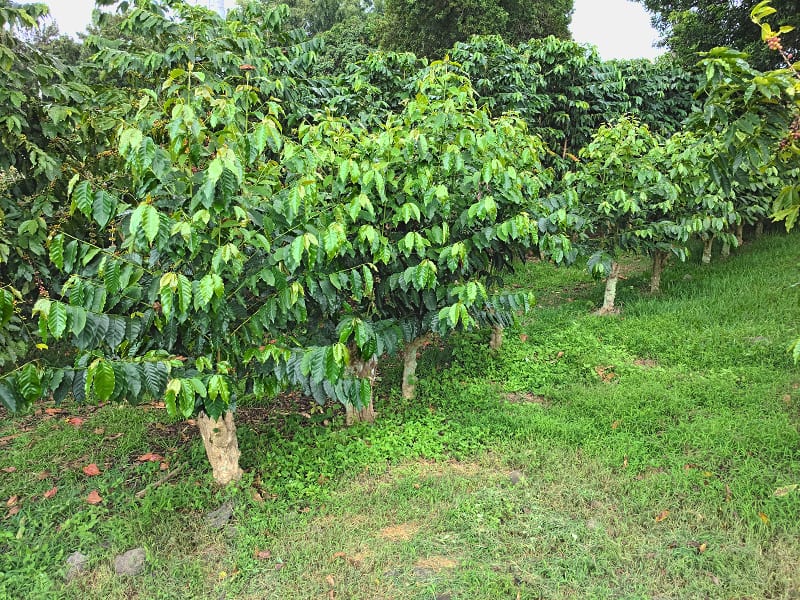
Oahu Coffee Beans
More than 180 acres of coffee are being cultivated by the Dole Food Company on the island of Oahu. Most of this coffee is being grown between the towns of Waialua and Wahiawa along both sides of the Kamehameha Highway on former sugarcane lands on the Wahiawa Plateau.
The elevation of the coffee fields is about 700 feet above sea level, and the fields are surrounded by the Koolau and Waianae mountain ranges and set beneath Mt. Kaala.
The coffee fields are located above the coastal towns of Waialua and Haleiwa and overlook Oahu's beautiful north shore. Annual rainfall is about twenty inches and average temperatures are in the eighties.
The coffee plants are of the Typica varietal which is a type of Arabica coffee. The cultivation of this plantation is similar in style to the esteemed Kona Coffee in that it is picked by hand and wet processed.
Waialua Coffee Fields and Dole's Diversified Agriculture Program
The Waialua Coffee Fields total about 180 acres in coffee cultivation with more being planted.
While the coffee fields are in the hills overlooking the famed north shore, the coffee mill is located below in Waialua Town on the grounds of the former Waialua Sugar Mill. Dole's 20-acre cacao orchard is also located near Waialua town on the banks of the Kaukonahua River.
The Waialua Sugar Mill opened in 1896. It was exactly one century later that the sugar mill closed its doors and went out of business.
The diversified agriculture program initiated by Dole was in part meant to provide employment for its displaced workers while also creating new products for the local market, including new emerging markets on Oahu's north shore.
Products chosen by Dole included tropical flowers, papayas, mangoes, cacao and coffee. Dole's Chairman David Murdock was very interested in coffee and cacao due to their antioxidants which are said to provide health benefits.
Waialua Coffee and Cacao Mill - The Old Sugar Mill
Today the “Old Sugar Mill” site is the site of the Waialua Farmer's Market as well as the Waialua Coffee and Cacao Mill where the Dole Pineapple Company processes coffee and chocolate.
Adjacent to the mill is the Island X Hawaii Store which sells coffee, chocolate and other locally produced products. Island X Hawaii also offers short, free mill-site tours. Coffee offerings at Island X Hawaii include 100% Waialua Coffee available in different processing methods.
Dole Food Company tends the Waialua coffee fields and Island X Hawaii purchases the raw Arabica coffee beans, which are of the coffee plant varietal Guatemalan Typica.
Also at the Old Sugar Mill are other shops including the North Shore Soap Factory which offers a daily tour. Every Saturday the Old Sugar Mill hosts the Waialua Farmers Market which offers a variety of north shore fruits and vegetables as well tasty treats such as the famous kiawe-grilled huli huli chicken.
Coffee Processing of Waialua Coffee
Both wet processing and dry processing methods are used to provide customers with more choices. Island X Hawaii also does the roasting, labeling and packaging of the Waialua Coffee.
Wet Processing
The wet processed Waialua coffee is washed and soaked in water for fermentation and then the coffee beans are sun-dried on raised mesh drying racks. This method provides good quality control because unripe coffee beans float to the surface during wet processing and can be discarded. The result is a more refined and “clean” tasting coffee than is typical of dry processing.
Dry Processing
The dry processing (also called natural processing) of Waialua coffee involves picking the coffee beans well after they have ripened. The coffee cherry (coffee fruit) turns black and fermentation of the fruit occurs naturally on the coffee plant.
Coffee "Raisins"
Known as “raisins,” the over-ripened coffee beans are then picked and spread out to dry in the sun. While perhaps not as clean and refined as wet processed coffee, the benefits of dry processing include a fuller-bodied brewed cup of coffee with a livelier taste.
Also offered by Waialua Coffee, when available, are Peaberry and Peaberry Select coffee beans. These are wet processed coffee beans of the peaberry variety, which means the coffee cherry held one whole bean rather than two half-beans. Only about 4% of Waialua coffee fruit contain Peaberry coffee beans.
For more information see: Hawaii Coffee; Big Island Coffee; Kona Coffee; Oahu Coffee; Maui Coffee; Molokai Coffee; Kauai Coffee; Hawaii Coffee Grading; Hawaii Coffee Facts; Hawaii Coffee History - Kona Coffee History; Kona Coffee Farm Tours.
Oahu Coffee and Espresso Brewing Tips
For tips on brewing the perfect cup of Hawaii coffee see our section titled All About Coffee including tips on coffee brewing. You can also read detailed coffee flavor profiles of gourmet coffee and instructions on preparing the finest Espresso Drink Recipes.
For tips on espresso brewing see Pulling A Perfect Espresso Shot as well as the How to make a Latte.
See detailed definitions of coffee terminology in the Coffee Terms. History buffs will love the World's Best History of Coffee.
Buy Hawaii Coffee Beans
- ✔️ Fresh roasted to order
- ✔️ 100% high qualtiy Arabica coffee
- ✔️ Custom grind (or whole bean)
- ✔️ 1-way valve, laminate bag (for freshness)
- ✔️ Bulk discounts


Leave a Reply